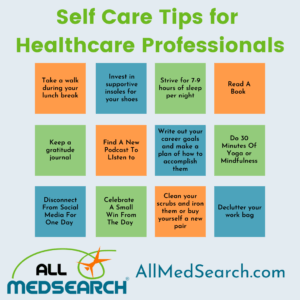
Nursing is an extremely stressful occupation than can take its toll. Unfortunately, the fatigue and stress that come with the job can negatively impact a nurse in several different ways. Many nurses ignore self-care practices despite this being an important tool to utilize in regular intervals. With self-care, nurses can decrease their stress, improve their health, and live happier and longer lives while also taking better care of their patients.
What is Self-Care?
According to the WHO, self-care is defined as, “what people do for themselves to establish and maintain health, and to prevent and deal with illness. It is a broad concept encompassing hygiene (general and personal), nutrition (type and quality of food eaten), lifestyle (sporting activities, leisure, etc.), environmental factors (living conditions, social habits, etc.) socio-economic factors (income level, cultural beliefs, etc.) and self-medication”. While self-care is important for employees in every field, it is especially important for nurses who can experience caregiver burnout.
Why Do Nurses Need to Practice Self-Care?
The reason why many nurses do not indulge in self-care is because nursing is a time-consuming occupation that can easily result in burnout. According to a recent survey, over 92% of nurses have reported moderate-high levels of stress. This can lead to several health issues that are entirely preventable. Some of these conditions include heart disease, asthma, obesity, and premature death.
How Does Stress Impact a Nurse’s Patients?
Another reason for nurses to practice self-care is that when they cannot take care of themselves, it makes it more difficult for them to take care of others. Over 70% of nurses reported that they put their patients’ needs ahead of their own. To best take care of patients, nurses need to maintain low levels of stress. When nurses are not in the best state of mind, patients and patient-care suffer as a result. According to this 2012 survey of 2,500 registered nurses, 18% experienced depression. This number is concerning because, “nurses who are not present and caring for themselves have higher patient falls, medication errors, and lower quality of care scores”. Not only is a lack of self-care an issue for nurses, but it causes patients to suffer as well.
Ways to Practice Self-Care for Nurses
The American Nurses Association Code of Ethics states that nurses must practice self-care as well. According to the ANA, there are seven areas of self-care that a nurse needs to practice. These seven areas of self-care are mental, physical, emotional, spiritual, social, personal, and professional.
Ideas to Get Started
Below you will find several ways for nurses to get started on their self-care journey.
Mental
Intellectual self-care can help nurses strengthen their confidence in the workplace and stimulate their minds. It also allows them to take the time to gain knowledge in subjects outside of caregiving and allow them to take a mental break from the stressful world of nursing.
At Work
- Read a nursing journal
- Attend in-service training
- Mentor a student or nursing grad
- Complete a CEU course
At Home
- Listen to a podcast or an audiobook on a topic of interest (some nurses may even enjoy doing this on the way to work)
- Explore a museum or art gallery
- Read a new book
- Do a crossword puzzle
- Play sudoku
- Play a game
- Do a puzzle
Physical
While nursing is a physically active career, this is not enough to meet the CDC’s requirements for an active and healthy lifestyle. The CDC recommends, “2.5 hours of moderate aerobic activity, such as brisk walking, one hour and 15 minutes of vigorous-intensity aerobic activity, or some combination of the two. You also need two or more days of strength activities that work all major muscle groups” per week. While this may sound intimidating and difficult to implement with a busy schedule, setting aside the time to indulge in physical self-care can lead to several healthy benefits and reduce stress.
At Work
- Take a walk during your lunch break
- Park farther away from the building
- Use the stairs instead of the elevator
- Bring your own lunches and snacks to work
- Do documentation while standing
- Walk around the halls during your break
- Invest in supportive insoles for your shoes
At Home
- Make a meal plan for the week
- Meal prep during the week
- Keep healthy snacks within view – you will be more likely to reach for them if it is the first food you see
- Cut up fruits and vegetables to make them more convenient to eat later
- Find a form of exercise you enjoy
- Find a workout partner
- Enjoy a massage
- Take a nap – even a 20-minute one can be extremely beneficial
- Strive for 7-9 hours of sleep per night
Emotional
Being a nurse is emotionally taxing. There may be patients you have become close to whose health may deteriorate despite your best efforts. You may even lose patients you have become close to. For this reason, emotional self-care and having an outlet for these emotions is extremely important.
At Work
- Praise your own accomplishments
- Praise your coworkers
- Be kind to others
- Do something that makes you smile on your break – text a good friend, watch a funny video, listen to your favorite song, or go outside and take a few deep breaths of fresh air
At Home
- Plan lunch with a friend or loved one
- Call a friend
- Make a ‘happy playlist’ filled with songs that make you smile and feel good
- Write down your feelings in a journal
- Plan your dream vacation – even if you do not end up taking that vacation, it is still a ton of fun to dream about it!
- Watch a funny TV show
- Indulge in your hobbies
Spiritual
Whether you are religious or not, spirituality is a key component in self-care. Spiritual self-care could mean connecting with your religious faith or connecting with your inner self and creating a sense of peace within.
At Work
- Practice meditation
- Advocate for patients who want prayers or a Chaplain
- Eat outdoors and observe nature
At Home
- Try doing yoga
- Keep a gratitude journal
- Volunteer for a cause that is important to you
- Join a religious organization
- Practice deep breathing
Social
Humans are social creatures that crave interaction with others. Whether you consider yourself an introvert or an extrovert, everyone needs positive interactions with other people.
At Work
- Ask your co-workers about their day
- Eat lunch with someone new
- Celebrate with your coworkers – baby showers, birthdays, etc.
- Talk to the barista, janitor, or someone else you normally would not talk to
At Home
- Call a friend
- Make lunch or dinner plans with a loved one
- Plan a date night
- Go out to a movie with a friend
- Play with your kids
Personal
Not only is self-care healthy, but it can also be a fun way to indulge! Nurses should make the time for things that they enjoy. Nurses should take the time to cultivate their identity outside of being a nurse to help make them feel less stressed.
- Relax with essential oils
- Take a long bubble bath
- Purchase your favorite drink
- Try out a new hobby
- Schedule a pedicure and a blow-dry at the salon
- Go on a day trip or a staycation
Professional
By keeping your professional life organized, nurses can help to keep themselves calmer during stressful work situations that may arise. Nurses should make sure that they are giving themselves the same respect and care that they give their patients.
- Clean your scrubs and iron them or buy yourself a new pair
- Declutter your work bag
- Take a break when you need one
- Write out your career goals and a plan to accomplish them
- Help your coworkers with their patients
Gifts for Nurse Self-Care
- Insoles, compression socks, or new orthopedic shoes can help to alleviate pain in your back, legs, and feet
- A yoga mat, free weights, and a resistance band can help a nurse workout from the comfort of their home
- Adult coloring books and colored pencils
- A journal to jot down your feelings and ideas
- Fresh flowers to brighten up a room
Self-Care Apps for Nurses
- Headspace – Headspace is a great app to help you meditate and clear your mind.
- Shine – Shine helps you prioritize your mental health by assisting you in setting personal goals and sending motivational text messages.
- Colorfy – If you are looking to take your coloring books on the go, Colorfy is a great app to help you do just that. Take a few minutes during your break to relax and enjoy coloring.
- Five Minute Journal – If coloring books are not for you, take five minutes to journal your feelings instead. There are also daily inspiring quotes available on the app.
- Calm – Sleep is incredibly important to our overall health. Calm provides guided meditation, sleep stories, and a sleep timer to help you get the best sleep of your life.
- Talkspace – Talkspace provides online therapy access 24/7. If you need someone to talk to or are experiencing caregiver burnout, talkspace is a great option to find someone confidential to talk to and receive the help that you need.
Self-care is a necessity when it comes to being a nurse. With self-care, nurses not only take care of themselves, but take better care of their patients as well. Take a few minutes today to practice self-care!
Braidy Gruzd
